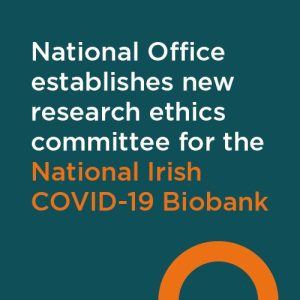 The National Irish COVID-19 Biobank (NICB) is a health research infrastructure that collects and stores biological samples and associated health data, with the aim of supporting Ireland’s research response to COVID-19. To ensure its operation is underpinned by robust ethical standards, the Department of Health has tasked the National Office for Research Ethics Committees with establishing and supporting the operations of a single, dedicated research ethics committee (REC) for the NICB (NICB-REC).
The National Irish COVID-19 Biobank (NICB) is a health research infrastructure that collects and stores biological samples and associated health data, with the aim of supporting Ireland’s research response to COVID-19. To ensure its operation is underpinned by robust ethical standards, the Department of Health has tasked the National Office for Research Ethics Committees with establishing and supporting the operations of a single, dedicated research ethics committee (REC) for the NICB (NICB-REC).
The development has been welcomed by Minister for Health Stephen Donnelly TD, who comments: “The NICB is an essential component of Ireland’s response to the ongoing challenges of COVID-19. It is crucial that the collection, storage, and use of COVID-19 biological samples and data adheres to the highest standards in ethics and good governance. There is a critical need to ensure a consistent, robust, and transparent ethical oversight of all aspects of the NICB to protect the rights of individuals.
It is for this reason, I welcome the establishment of the NICB Research Ethics Committee, under the remit of the National Office for Research Ethics Committees. The NICB-REC will ensure governance of this important national resource meets the highest ethical standards. This committee will also provide essential expertise in ethical considerations for the future development of biobanking, enhancing Ireland’s broader health research infrastructure.”
The NICB-REC will provide ethical oversight of the NICB, and ensure it is established, governed, maintained and accessed in accordance with best national and international ethical practices and in compliance with data protection legislation. Committee members have been appointed from diverse backgrounds, bringing a range of lived experiences to the table and contributing expertise in areas such as biobanking, bioethics, medical law, data protection, respiratory medicine, geriatric medicine, immunology, and epidemiology.
Dr Georgina Flood, newly appointed Chair of the NICB-REC and Consultant Anaesthetist at the Mater Hospital, says: “The creation of the NICB and the establishment of a dedicated REC to underpin it is a huge development for Ireland. Whilst the NICB offers unprecedented scientific potential, it is absolutely imperative that the ethical issues surrounding it are carefully considered and managed – not least as the legal and ethical frameworks around biobanking are still evolving.
The establishment of this new committee will lead the way, utilising the highest level of national expertise to protect patient safety and safeguard the rights and autonomy of participants. In this manner, the committee will support the development of this significant national infrastructure in line with the highest of ethical standards, securing the future of the NICB as a valuable and important national resource.”
Through its support for the NICB-REC, the National Office for Research Ethics Committees is continuing its mission to embed a robust, transparent and cohesive research ethics review system that strengthens the national research infrastructure. The National Office is hosted and supported operationally by the Health Research Board.
Commenting on the development, Head of the National Office Dr Emily Vereker said: “The establishment of the NICB-REC is another important milestone on Ireland’s journey towards a truly national system of ethics review, by delivering single national ethics opinions on research areas of national importance. This will facilitate innovative research on COVID-19, making Ireland an attractive location for new studies while safeguarding the fundamental rights and freedoms of patients and the public.”
The remit of the NICB-REC is to provide ethical oversight of operation and governance of the NICB itself. It will not be responsible for ethics review of individual requests for access to the biobank, which will continue to be managed through the RECs of the individual biobank sites (please consult the NICB website for details on the institutions involved).
Read more about the NICB-REC here and find out more about the Committee members here.

